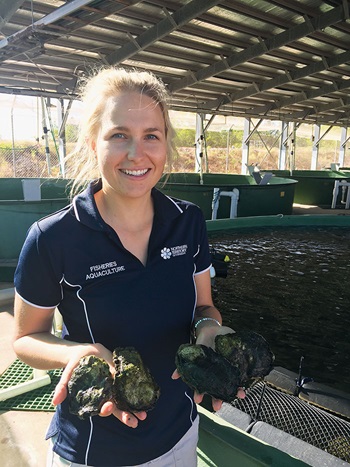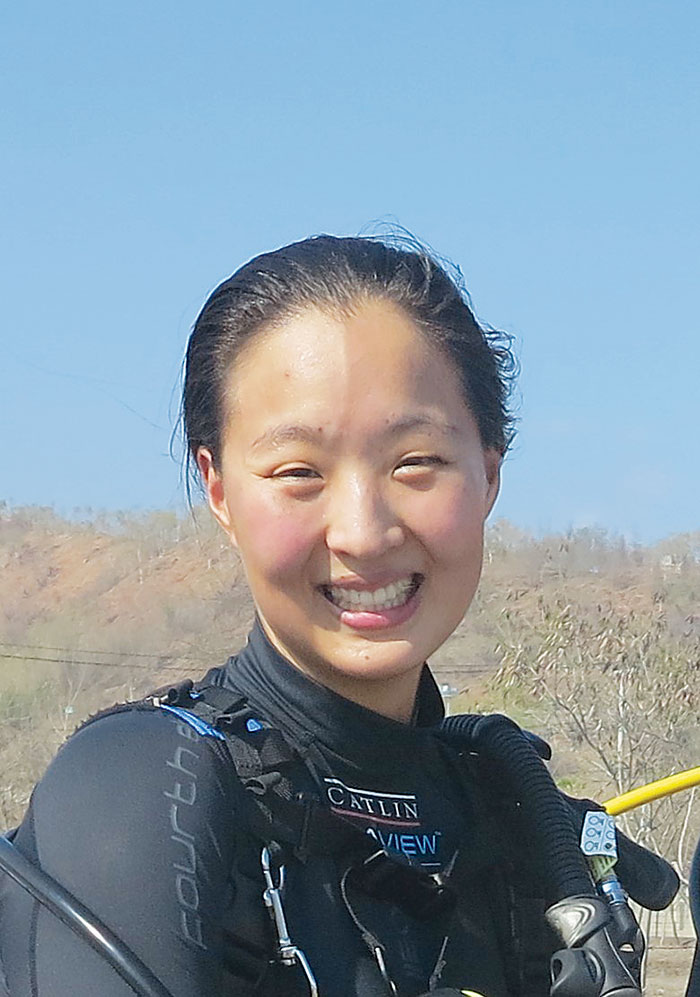Research students from the north take the lead in this year’s Australian Marine Sciences conference
Tropical rock oyster aquaculture and coral reef biodiversity were the topics of two winning student presentations at the Australian Marine Sciences Association (AMSA) conference in Darwin in July 2017.
Samantha Nowland won the FRDC-sponsored award for the best student oral presentation, which outlined an Indigenous economic development project in the Northern Territory focusing on the native Black-lip Oyster (Saccostrea mytiloides). The presentation was part of her research as a PhD candidate with the University of the Sunshine Coast. She also works as an aquaculture research scientist at the Darwin Aquaculture Centre, which has been involved in the oyster project since 2009.
Indigenous oysters
 Samantha Nowland
Samantha Nowland Catherine Kim
Catherine KimSamantha Nowland says the aim of the project is to develop an aquaculture industry that would allow the remote Warruwi community on South Goulburn Island and
the Pirlangimpi community on Melville Island to undertake small-scale wild harvesting of oysters. Production would target premium local markets.
Challenges include the lack of basic species information, which is linked to an unreliable supply of oyster spat. Monitoring for water and meat quality – essential in producing a commercially marketable product – is also ongoing.
The project’s successes include:
- developing a suitable grow-out system for remote communities that can be easily maintained by local people;
- incorporating training and capacity building into all aspects of oyster grow-out, with an emphasis on practical, on-country delivery; and
- establishing research partnerships with Charles Darwin University to investigate socio-cultural issues, engagement and governance arrangements.
Samantha Nowland says the project has established a productive partnership with the local Yagbani Aboriginal Corporation, gathering the multidisciplinary skills needed to support the fledgling industry. Success will lie in long-term, cooperative partnerships that are based on trust and driven by the community.
Coral reef diversity
The winner of the FRDC’s student poster presentation, PhD candidate Catherine Kim, focused on the marine cryptofauna, or invertebrates, of the Timor-Leste coral reefs. Her work highlights the lack of data on cryptofauna and how they relate to other important groups, such as reef fishes, and benthic composition.
Timor-Leste is one of six member states of the Coral Triangle, which is the epicentre of marine biodiversity globally. It is also one of Australia’s closest neighbours and is heavily reliant on small-scale fisheries for food security.
Understanding coral reef composition and associated fauna is important to help sustain Timorese reefs for their biodiversity, economic value and fish resources.
Catherine Kim was able to DNA barcode a range of brachyuran crabs or ‘true’ crabs (as opposed to hermit crabs) – crustaceans of the infraorder Brachyura. These had been collected from US sampling units on the north coast of Timor-Leste from 2012 to 2014. She found 37 per cent of the 75 species identified were unique to Timor-Leste. Most crabs collected were classified as ‘rare’ with only one known sample of 45 per cent of the species identified.
As an XL Catlin Ocean PhD scholar, part of her PhD research at the University of Queensland, she is also assessing kilometre-scale benthic composition, reef fish biodiversity and biomass data of Timorese reefs.
Other awards
Other awards presented at the AMSA conference included the Jubilee Award for Excellence to Peter Steinberg, director of the Sydney Institute of Marine Sciences, an expert in marine ecology and biochemistry.
The AMSA Technical Award went to Brett Womersley, chief technical officer for Fisheries Victoria, who has coordinated and assisted with field research throughout the state for the past decade. The Allen Award to assist a postgraduate student with travel costs went to Paige Kelly at the Institute for Marine and Antarctic Studies, who will attend two international symposiums related to her work on krill.
FRDC Research Code: 2010-205





